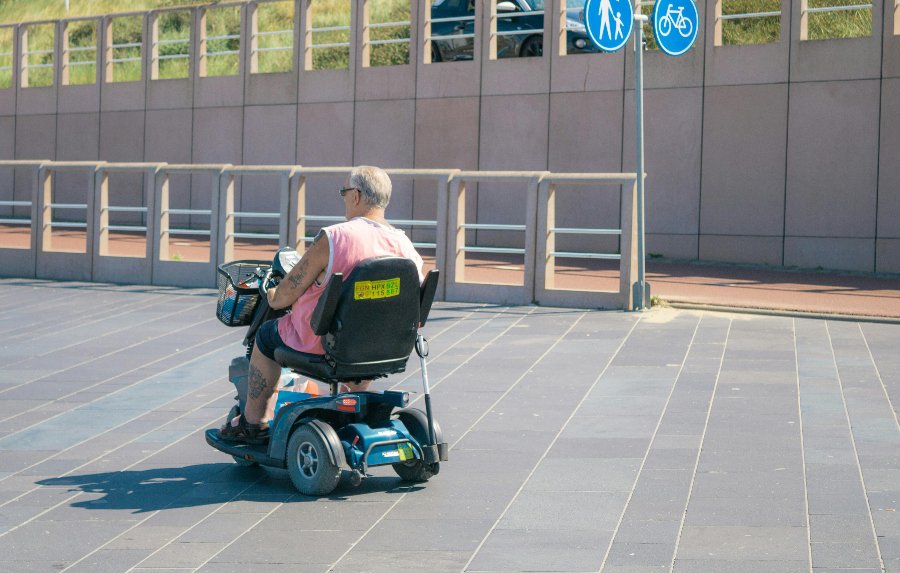Mobility scooter insurance intermediary Surewise has joined forces with charities, mobility retailers, and academics to urge the UK Government to act on rising casualties, inadequate infrastructure, and the growing tide of hostility and verbal abuse faced by many mobility scooter users.
Despite being legally used by people with disabilities and mobility issues, mobility scooters are often seen as a nuisance or even a menace, not the lifelines they truly are, says Surewise.
Dean Brook, from Nuneaton in Warwickshire, began using a mobility scooter after losing both legs below the knee due to complications from type 2 diabetes and neuropathy. Prior to that, Dean was fit and healthy, worked full time, and enjoyed playing football.
Dean said: “People shout at me in the street – telling me I shouldn’t be using a scooter, that there’s nothing wrong with me, or that I’m just lazy. I’ve lost count of how many times I’ve had to lift my trouser leg to prove to complete strangers that I have prosthetic limbs. It’s humiliating.”
Since launching the campaign, Surewise says it has become increasingly clear that stigma, social hostility, and everyday obstructions pose an equally serious threat to mobility scooter users’ wellbeing and independence as well as the physical dangers on the roads.
Surewise launched the Safer Mobility Campaign in April 2024 after uncovering a troubling 20 percent year-on-year rise in serious injuries and deaths involving mobility scooter users over the past decade. In 2023 alone, 16 mobility scooter users were killed in collisions, nearly double the nine fatalities recorded in 2022.
Richard Hannan, Director of Surewise, commented: “These are already vulnerable people, many of whom face serious medical conditions – and yet they’re insulted, ignored, mocked and blocked, simply for trying to live independently.
“This inequality in perception and treatment can no longer be ignored. We need formal recognition, national guidance and visible support to change how mobility scooter users are seen – and to make our streets safer and more inclusive for everyone.”
The call is backed by organisations across the disability, research, and retail sectors, including Wheels for Wellbeing, Nottingham Trent University, Warwickshire Road Safety Partnership, and Mobility and Lifestyle.
Legally, mobility scooters can be used on the pavement, and Class 3 scooters are permitted on the road, although many road users are unaware of these rules. Mobility scooters are not legally allowed in cycle lanes, yet this too is often misunderstood says Surewise.
Campaigners say this confusion fuels public hostility, with users frequently shouted at to “get off the road” or “off the pavement”, sometimes during the same journey.
Andy Collins, Branch Sales Manager at Mobility and Lifestyle in Nuneaton, commented: “There are more and more scooters out there now. It’s become the norm, and users deserve to feel entitled and empowered to use them without fear or judgement.
“Unfortunately, what we see far too often is that they can’t win. They get abuse on the pavements, and they get abuse on the roads. On top of that, infrastructure problems and busy town centres put people off even leaving their homes.
“Over the years, we’ve known several customers involved in crashes – including one who was tragically killed. These aren’t isolated incidents. They reflect a much wider issue that needs urgent attention.”
The Safer Mobility Campaign is urging the Department for Transport to update the Highway Code to explicitly include mobility scooter users in the “Hierarchy of Road Users”, which is a framework that was introduced in 2022 that prioritises the safety of the most vulnerable.
Despite their vulnerability, mobility scooter users remain absent from this guidance, putting lives at risk and reinforcing negative perceptions.
They are calling for better public education on the rules and rights so that mobility scooter users can travel safely without fear or confrontation.
Professor Duncan Guest, Head of Psychology at Nottingham Trent University, is leading a research study into the lived experiences of mobility scooter users.
He said: “Our research shows that after access difficulties, the negative attitude of others to mobility scooter users is the biggest disadvantage experienced by users. They feel they are seen as a nuisance, treated with hostility and looked down on and treated as second-class citizens.
“Given that users are already mobility impaired and vulnerable, it is clear that the way society thinks about and treats mobility scooter users has to change.
“This also needs to go hand in hand with education about safe use of mobility scooters both for users and non-users, so that collectively users of the road and pedestrian areas are better able to understand mobility scooter behaviour.”
Research from Citizens Advice has revealed that someone makes a complaint every hour about assistive technology, with the majority of complaints being about defective goods.
The post Mobility campaign uncovers 20 percent year-on-year rise in injuries involving mobility scooters appeared first on AT Today – Assistive Technology.

